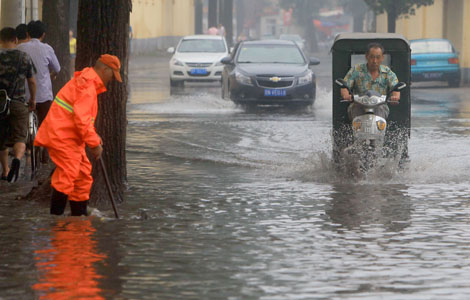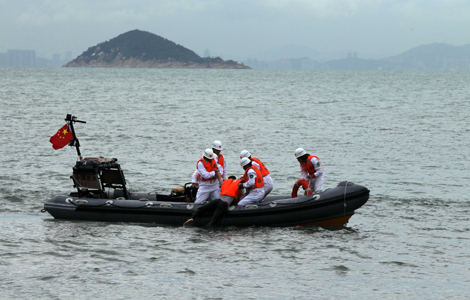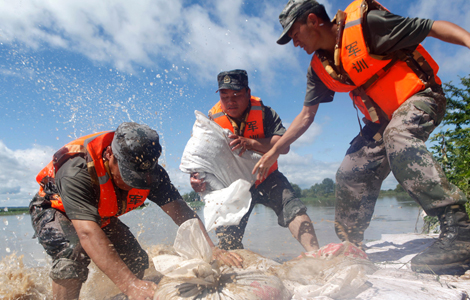Smooth sailing for maritime rescue
Updated: 2013-08-12 08:21
By Zhao Lei (China Daily)
|
||||||||
Thousands of foreign citizens saved at sea in the last decade
Thousands of foreign nationals stranded at sea have been rescued by Chinese search and rescue ships in the 10 years since the overhaul of the system.
Wang Zhenliang, director of the rescue and salvage bureau under the Ministry of Transport, told China Daily in an exclusive interview that more than 5,300 foreign citizens and 347 foreign ships were rescued by Chinese maritime officers from 2003 to 2012.
The largest-scale rescue took place in May 2006, when several hundred Vietnamese fishermen and dozens of fishing boats were stranded by Typhoon Chanchu.
Vessels dispatched by the Nanhai Rescue Bureau traveled 17 days and 11,500 kilometers and rescued 330 Vietnamese fishermen.
"Rescuers from our maritime rescue and salvage system have performed more than 8,700 operations since 2003," Wang said.
Wang's office administers three rescue bureaus, three salvage bureaus and four flying rescue squadrons.
A total of 34,030 people who encountered danger at sea and 1,873 ships were saved since 2003, he said.
Though China's maritime rescue and salvage system has advanced tremendously over the past 10 years, it still lags behind in terms of dealing with large-scale oil spills and retrieving heavy ships, according to the director.
In addition, China is weaker than many countries with advanced maritime capability when it comes to search and rescue in unfavorable weather and in handling emergencies in deep water, he added.
"China is now able to send salvage workers into water 300 meters deep, but if something happens below that depth we could do nothing about it," he said. "Some developed economies are capable of operating underwater as deep as 600 meters."
Meanwhile, the maritime rescue and salvage system in China is facing bigger risks of oil leaks as a result of the nation's expanding output of gas and petroleum from the ocean and a remarkable surge in cargo ships passing through China's waters.
Wang said 160,000 trips are made in China's waters by oil tankers each year.
"How to dispose of a large oil spill remains a tough question for maritime authorities around the world. Current solutions can't completely remove the pollutants and they bring side effects to the environment," said Liu Jinzhang, an official at the Donghai rescue bureau.
For officers in the Nanhai rescue bureau, difficulties include language and cultural disparities, according to Liu Haijun, publicity head at the bureau.
The central government has invested heavily in maritime rescue and salvage, Wang said.
"From 2003 to 2012, we built and bought more than 100 advanced, well-equipped vessels and 10 helicopters. The improvement in facilities, equipment and training has enabled us to operate in a hurricane of Level 12 (of the Beaufort scale) instead of the previous Level 6," he said.
His bureau's emergency response capability has also significantly improved. Rescuers set out within 18 minutes after receiving calls for assistance, according to the director.
Wang Zhenghua in Shanghai contributed to this story.

 Spanish skyscraper forgets elevator
Spanish skyscraper forgets elevator
 Beijing rainstorm cancels flights, kills airport worker
Beijing rainstorm cancels flights, kills airport worker
 highs and lows of marine rescue
highs and lows of marine rescue
 Lin Dan wins Olympic final rematch over injured Lee
Lin Dan wins Olympic final rematch over injured Lee
 Northeast China braces for major floods
Northeast China braces for major floods
 High-heeled, well heeled
High-heeled, well heeled
 Thunder storm hits Beijing, darkening the sky
Thunder storm hits Beijing, darkening the sky
 Fans stay away as worlds get off to sweaty start
Fans stay away as worlds get off to sweaty start
Most Viewed
Editor's Picks

|

|

|

|

|

|
Today's Top News
New green policy gives industries a big boost
Northeast China braces for major floods
Launches highlight India's ambitions
Chinese put on alert in Afghanistan
Questioning China's achievements
Go-between helped to cement deal
The only way now is up
Japan to carry out self-defense
US Weekly

|

|




